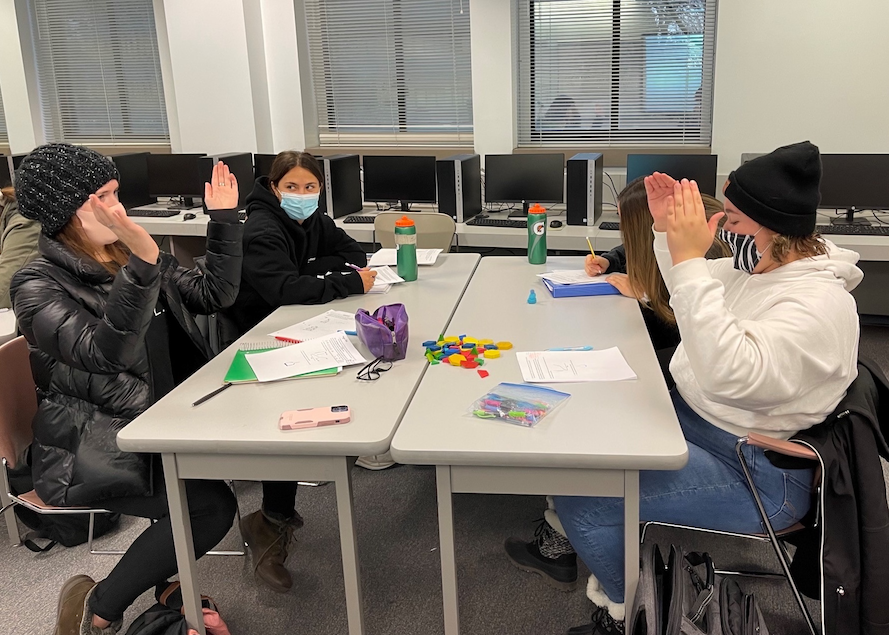Mathematics for Elementary School Teachers (MELT) Major
The Major in Mathematics for Elementary School Teachers (MELT) prepares students who aspire to be elementary school teachers to become mathematics education leaders. Students will obtain a strong mathematics background, taking several of the mathematics courses required of the math major for secondary school teachers. Graduates will be well prepared to serve as "mathematics specialists" in their schools – able to play leading roles in mathematics education in their schools and mentor other teachers. The major is limited to students enrolled in the teacher education program in the College of Education who seek grades 1-8 certification.
A good candidate for the MELT major:
- Has excellent grades in all four years of high school mathematics through precalculus,
- Has high scores on the mathematics portions of the SAT or ACT exams,
- Enjoys learning mathematics and solving mathematical problems and puzzles,
- Earns a grade of B of higher in MATH 1400 (Elements of Calculus 1).
The MELT major is rewarding but also demanding. There is a big jump in difficulty from MATH 1400 and MATH 1451 to MATH 2350 (Foundations of Mathematics), and a second jump from MATH 2350 to 3000 and 4000 level mathematics courses. Students should anticipate these challenges, and be prepared to work hard and seek help outside of class. [Richard Dahlke's guide for students, How to Succeed in College Mathematics, is a valuable resource].
Students planning to complete the MELT major should consult with an advisor in the Department of Mathematical and Statistical Sciences (Dr. Marta Magiera) and with the Director of Undergraduate Advising in the College of Education. It is important for students to meet with their advisors as early in their studies as possible in order to map out a path to timely graduation.
Special note regarding academic progress in the major:
An average GPA of 2.75 in MATH courses is required for student teaching. So grades of B- or lower must be offset by grades of B or higher. A grade of C- or lower is especially serious, because the course must be repeated, possibly extending the time to graduation. Several grades of C- or lower make it unlikely that the student will be able to complete the major. In that case, a different academic major should be considered.
Expand all | Collapse all
What jobs do students get after graduation?
Graduates of the MELT program work as K-8 mathematics teachers. Some students continue on to graduate programs in mathematics or mathematics education.
Course requirements
The major requires the following mathematics courses:
| MATH 1450 |
Calculus 1 |
| MATH 1451 |
Calculus 2 |
| MATH 2030 |
Problem Solving and Reasoning for Teachers |
| MATH 2031 |
Number Systems and Operations for Elementary School Teachers |
| MATH 2032 |
Algebra and Geometry for Teachers |
| MATH 2350 |
Foundations of Mathematics |
| MATH 3100 |
Linear Algebra and Matrix Theory |
| MATH 3700 |
Introduction to Modeling |
| MATH 4300 |
History of Mathematical Ideas |
| MATH 4320 |
Theory of Numbers |
| MATH 4420 |
Foundations of Geometry |
| MATH 4720 |
Statistical Methods |
Requirements for certification
To be eligible for middle childhood/early adolescence teaching license, students must complete the following courses offered by the College of Education: EDUC 1000 EDUC 1001, EDUC 2001, EDUC 2002, EDUC 2330, EDUC 4000, EDUC 4003, EDUC 4307, EDUC 4217, EDUC 4327, EDUC 4337, EDUC 4357, EDUC 4367, EDUC 4964, and EDUC 4966. Students must also check with their advisers in the College of Education about a sequence and admission requirements. Usually, EDUC 4966, Student Teaching, is the last course in the program. Students must apply and be approved by the Office of Teacher Education to student teach. To qualify for Student Teaching, students must maintain a minimum of 2.75 GPA in mathematics.

